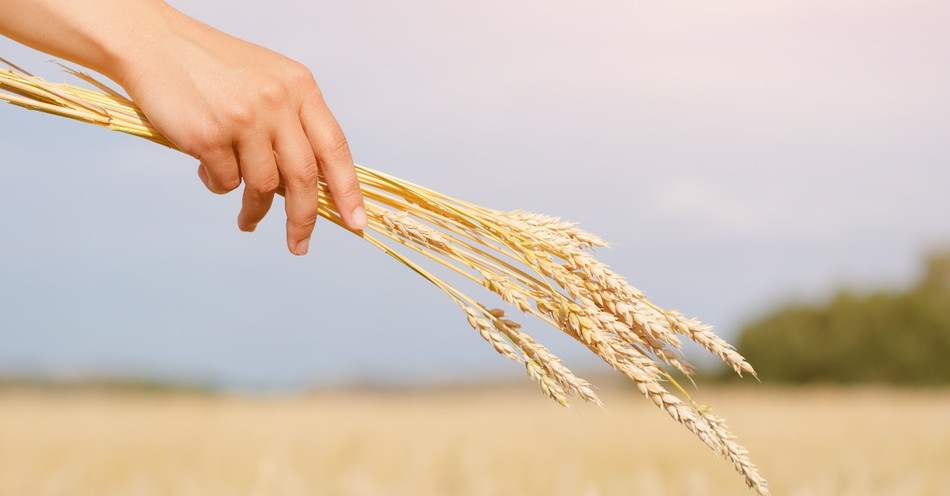To understand the feast of firstfruits, we need to start by considering what firstfruits are—and what they meant to the farmers who lived in Old Testament Israel.
Consider the scene. Every year, the seeds rest beneath the hardened crust as winter blankets the Earth. Finally, they break through the soil as spring’s breeze whispers its promise. The seedlings arch closer to the sun daily until the farmer breaks off the seed head. Golden grain fills his hands as he rubs the stalks together. He chews a hardened kernel. The firstfruits of his labor prove ready for harvest.
What Does Firstfruits Mean?
A few words in scripture translate as “firstfruits.” The first, bikkurum, occurs in multiple Old Testament passages. One of these passages, Exodus 23:19, reads, “The first of the firstfruits of your land you shall bring into the house of the Lord your God” (NKJV).
A synonym for bikkurum, reshith comes from the more familiar rosh and infers beginning, chief, or first. Used in scriptures such as Deuteronomy 18:4, 21:17, and 26:1-2, the word translated first identifies God’s expectations.
“And it shall be, when you come into the land which the Lord your God is giving you as an inheritance, and you possess it and dwell in it, that you shall take some of the first of all the produce of the ground, which you shall bring from your land that the Lord your God is giving you, and put it in a basket and go to the place where the Lord your God chooses to make His name abide.” (Deuteronomy 26:1-2 NKJV)
Unable to delineate clear differences between bikkurim and reshith, scholars think that reshith implies human effort and bikkurim conveys natural production.
The Greek word aparchē, used eight times in the New Testament, applies the concept of firstfruits metaphorically. It points to:
- firstfruits of the Spirit (Romans 8:23)
- firstfruit of Israel (Romans 11:17)
- firstfruits of those who believe (Romans 16:5)
- Christ as the firstfruits (1 Corinthians 15:20, 23)
- firstfruits soon to be saved (2 Thessalonians 2:13-14)
- firstfruits of the coming Kingdom (James 1:18, Revelation 14:14)
What Was the Feast of Firstfruits?
During their sojourn in the wilderness, God’s people relied on manna from heaven for sustenance. After entering the Holy Land, God instituted the Feast of Firstfruits, symbolizing thanksgiving and reliant obedience.
Each year, pilgrims journeyed to Jerusalem in procession from every part of Israel. Once there, crowds greeted the travelers with cheers and flute playing. The words of Psalm 30 resounded as the Levitical choir welcomed those bringing their brimming bowls to the Temple Mount. Finally, each person presenting firstfruits recited Deuteronomy 26:5-10 as he acknowledged God’s power to deliver, save, and provide for his needs.
Why Does God Get the Harvest’s Firstfuits?
Why did God require his people to surrender the best and the first of their harvest? Perhaps the answer lies within the Hebrew word bikkurum, which means ”promise to come” when literally translated.
The Israelites understood that God would bless their giving because sacrificing the land’s first yield would result in future blessings of abundance.
Consider the position of the Israelites who left Egypt and wandered in the wilderness for forty years. Giving up the best of one’s crops after such a lack could challenge some. Obedience requires faith in the Lord’s ability to provide.
Not only that, but the feast of firstfruits foreshadowed Christ’s resurrection. The feast of firstfruits, celebrated three days after Passover, marks the day Christ rose again. As Paul wrote, Jesus represents God’s fulfilled promise as “the firstfruits of those who have fallen asleep” (1 Corinthians 15:20 NKJV). Christ alone releases those who surrender their hearts to Him from bondage into blessing.
God reflected the appointed day of firstfruits when He gave His best—the Messiah—to redeem those enslaved by sin.
Who Failed to Sacrifice Firstfruits?
Although the Feast of Firstfruits occurred after God’s chosen entered Israel, the book of Genesis conveys the importance of giving God the firstfruits of harvest as worship. Genesis 4:3-5 reveals what happened:
“. . . in the process of time it came to pass that Cain brought an offering of the fruit of the ground to the Lord. Abel also brought of the firstborn of his flock and of their fat. And the Lord respected Abel and his offering, but He did not respect Cain and his offering. And Cain was very angry, and his countenance fell.” (NKJV)
As we read these few verses, we discover that Able presented the best of his flock while his brother only offered some of the harvests and retained the preferred portions for himself. Cain presented God, the Lord of all creation, with leftovers.
Since Cain’s heart posture reflected greed and distrust, God rejected his sacrifice.
From the earliest times, people recognized that God—who gives in abundance—deserves our praise and worship. As with Cain, fellowship with the Lord suffers when we hoard our resources, time, and other gifts.
Do People Still Celebrate the Feast of Firstfruits?
The Israelites appear to have maintained the harvest celebration until the Babylonians carried them into captivity. 2 Chronicles 31:5 indicates that, upon God’s command and when they returned to Israel, the people reinstituted the Feast of Firstfruits:
“As soon as the commandment was circulated, the children of Israel brought in abundance the firstfruits of grain and wine, oil and honey, and of all the produce of the field; and they brought in abundantly the tithe of everything.” (NKJV)
The celebration continued until the Romans destroyed the Temple in 70 AD. Even though some Jews recognize the feast during the Passover meal by reciting portions of Deuteronomy, the people no longer offer sacrifices.
Why Does the Feast of Firstfruits Matter Today?
Few of us live on a farm or harvest gardens today in America. Even so, the feast of firstfruits has important lessons that we can apply. We may consider looking at the Hebrew calendar and keeping our own feast of firstfruits—finding the day that Jewish people would celebrate it, and treating it as a thanksgiving celebration where we remember how God has blessed us this year. Maybe we could make a commitment to give more—more time to charity or our church, more money to a good cause, more time to spend reflecting on God through Bible study or other spiritual disciplines.
Alternately, we can look for ways to imitate the spirit behind the feast of firstfruits. For example, Christians can celebrate God’s appointed day by:
- Setting aside Resurrection Sunday and the Sabbath. When we as believers hallow these days as sacred, we pay homage to the Lord, who is “the first in a long legacy of those who are going to leave the cemeteries.” (1 Corinthians 15:20 MSG)
- Giving God our firstfruits. Can we present the Lord with the first and best of our finances, time, and relational gifts as a part of our “living sacrifice”? (Romans 12:1 NIV)
- Remain hopeful as we look toward the Promise. Christ’s own words affirm that He will return for us, the firstfruits of the Kingdom. “In My Father’s house are many mansions; if it were not so, I would have told you. I go to prepare a place for you. And if I go and prepare a place for you, I will come again and receive you to Myself; that where I am, there you may be also.” (John 14:1-3 NKJV)
Photo Credit: © Getty Images/Mikhail Azarov

This article is part of our Bible resource for understanding the significance and meaning of biblical phrases and ideas. Here are our most popular Bible articles to grow in your knowledge of God's Word:
Promises of God in the Bible
Is "This Too Shall Pass" in the Bible?
What Was the Ark of the Covenant?
Top 10 Bible Stories for Kids
“Iron Sharpens Iron” in Proverbs 27:17
"Fearfully and Wonderfully Made" in Psalm 139
“Be Still and Know That I am God” in Psalm 46:10
"No Weapon Formed Against Me Shall Prosper" - Isaiah 54:17



